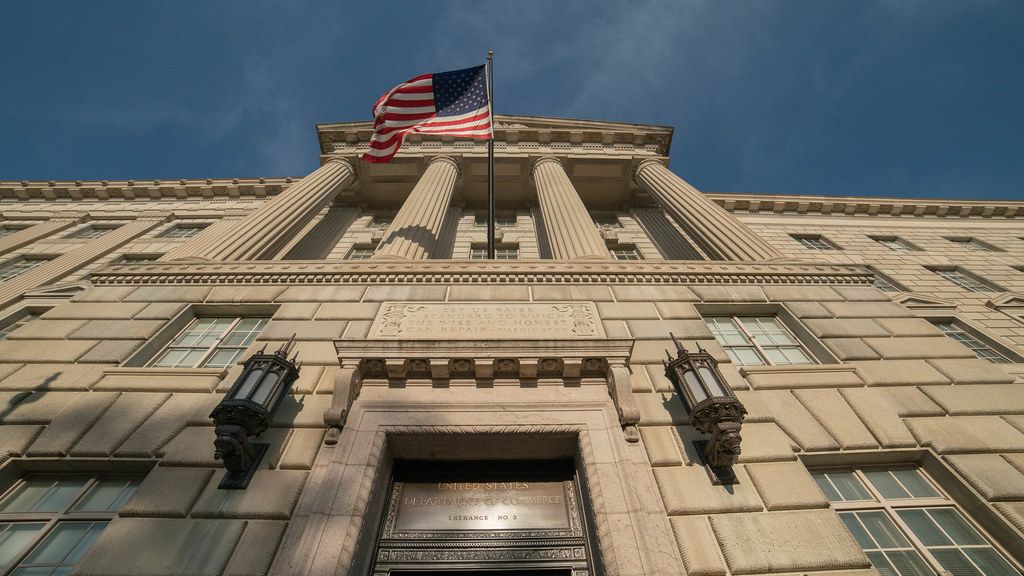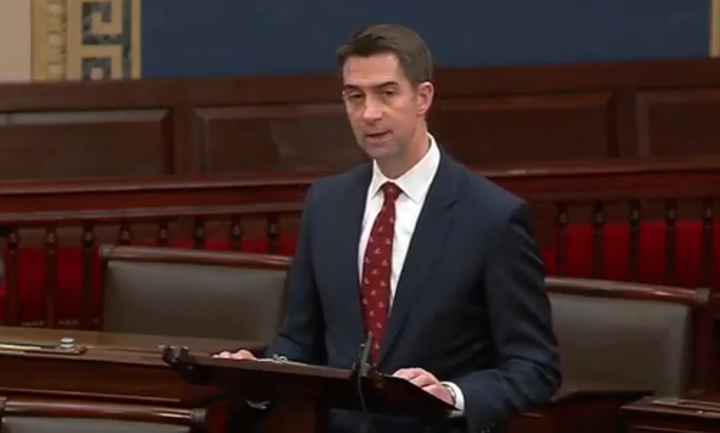Rogue Police Force Operating In US Commerce Department Further Exposed By Whistleblowers
Whistleblowers referred to the Investigations and Threat Management Service (ITMS) as the "gestapo."

A unit of the United States Commerce Department that was created to provide security for the commerce secretary operates as a rogue police force, targeting employees of Chinese descent and even an elementary school child who submitted a petition for the protection of marine wildlife.
Over a dozen whistleblowers contributed to an investigation completed by the U.S. Senate Committee on Commerce, Science, and Transportation. They examined the Investigations and Threat Management Service (ITMS).
ITMS was created under President George W. Bush but lacks the authority to conduct law enforcement. Nevertheless, under multiple presidential administrations, ITMS employees have engaged in criminal and counterintelligence investigations, prompting whistleblowers to refer to it as the “gestapo.”
The committee’s report [PDF] from the investigation documents rampant abuse stemming from a “Special Deputation” program. Agents believe this justifies carrying firearms, monitoring electronic and wire communications, and conducting "warrantless searches of office space and personal lockers on department grounds."
They maintained a database of records on foreign nationals and U.S. citizens and frequently retaliated against personnel who viewed practices as inappropriate or unlawful.
“The unit investigated employees across the Department of Commerce and within the ITMS by designating them as threats to critical assets, often without reasonable suspicion that the subject posed a particularized threat or maintained connections to hostile foreign actors,” the report declares. “This unchecked race-based targeting disproportionately impacted employees of Chinese ancestry.”
Sherry Chen, an award-winning Chinese-born hydrologist, was targeted by ITMS for allegedly downloading and distributing unclassified information to a foreign national. She was interrogated for seven hours. Agents “told her she could never discuss the interrogation with anyone, including her superiors.”
ITMS agents, according to Chen, gave her “paper to draft a statement and instructed her to write words they prepared after telling her that she did not need to consult with counsel.” She felt like she had no choice but write an incriminating statement because investigators were intimidating her.
The matter was referred to the Federal Bureau of Investigation’s (FBI) counterintelligence division, along with an “intelligence unit within the military.” A criminal complaint was filed in 2014, and Chen was arrested. But the Justice Department “dropped all criminal charges weeks later.”
A federal administrative judge who is part of the Merit Systems Protection Board (MSPB), which handles appeals from federal employees, found Chen had shared “public information” with a Chinese national. She is still a Commerce Department employee, but the U.S. government appealed her “reinstatement by the MSPB.”
“ITMS investigated Chunzai Wang, one of the world’s foremost experts on oceanic climate change, based on his connection to organizations associated with the Chinese government,” the report additionally details. “Wang served as a research oceanographer in the National Oceanic and Atmospheric Administration (NOAA) in Miami, Florida at the time.”
Despite ITMS having no law enforcement authority, they “executed a search warrant at his home and interrogated him for hours.” The targeting of Wang led to a criminal charge by federal prosecutors that he “accepted a salary from the Chinese government.”
Targeting A Child Concerned About Saving An Endangered Whale
A “protective intelligence” investigation was opened into an elementary school child, who submitted a petition to the commerce secretary that was signed by multiple classmates. The children requested that a “certain type of whale” be listed as protected marine wildlife under the Marine Mammal Protection Act of 1972.
“To any reasonable observer, the letter posed no threat to the Department,” the report recalled. “The ITMS, nonetheless, not only opened a case but conducted a search of the author’s name––a minor––in government databases like the FBI’s National Crime Information Center (NCIC) and the Department of Homeland Security’s Targeted Violence Information Sharing System (TAVISS).”
Rogue agents regularly charge targets of their “criminal investigations” with “obstruction, conspiracy, making false statements to federal agents, and resistance to search.” They also believe they can pursue individuals for “racketeering, money laundering, and theft of government property, espionage, economic espionage, and computer fraud.”
The report outlines a “troubling variety of tactics” employed to “gather intelligence.”
Whistleblowers told the committee that agents “regularly searched the office space of employees suspected of wrongdoing, which required forced entry through lock picking. These covert searches involved identity-concealing tactics, including the use of face masks, latex gloves, and shoe coverings.”
It has violated the civil liberties of U.S. citizens, performing “intelligence checks” against anyone associated with foreign visitors to the Commerce Department buildings.
“These searches involved querying both foreign nationals and U.S. persons in classified databases to determine whether they presented a threat to the Department, even without evidence indicating suspicious or malicious intentions,” according to the report.
“[One] whistleblower claimed that ITMS officials understood that these searches likely amounted to the ‘blatant disregard of constitutional rights’ because agents never obtained any form of legal authorization to monitor or surveil citizens.”
Additionally, committee staff was unable to figure out how the agents had access to classified intelligence databases. They are not part of the “Intelligence Community” and have no authority that would mandate access.
ITMS agents have “seized work phones and computers to perform digital content searches, practices that continued until the department required the unit to cease investigative activities in March 2021.”
Whistleblowers further claimed that agents scanned employee email accounts for “foreign influence as early as 2014.” They sought to uncover connections between employees and “actors within the Chinese government” and targeted “multiple divisions with a comparably high proportion of Asian American employees.”
The racist nature of unlawful investigations included running “ethnic surnames through secure databases even in the absence of evidence suggesting potential risk to national security,” whistleblowers said.
In fact, documents show “broad keyword searches” were utilized, such as “state key laboratory,” “overseas expert consultant,” “Ministry of Science and Technology,” “funding support,” “government support,” and “highly secret.”
The report stated, “Multiple whistleblowers claimed that the unit worked with officials at the CIA and FBI to devise the list of search terms and review the results.”
‘Gummy Bear Art’: A Byproduct Of A 'Baseless Investigation'
Senior officials backed ITMS agents, who perpetrated entrapment schemes against employees viewed as “disobedient and disloyal” largely because they “challenged the lawfulness of the unit’s practices.”
One notable “baseless investigation” was apparently part of a turf war with the Office of Executive Support (OES) within the Commerce Department. OES employees “were sequestered to different conference rooms” for an extended period.
An inspector general report found one ITMS official “monitored the employees for some time in a conference room, and eventually, employees resorted to watching Netflix, playing on their personal phones, and even made ‘Gummy Bear art’ on duty. Despite the suspension of duties during this period, the Department used $1,179,154 in taxpayer dollars to pay the sidelined OES employees for a ‘collective total of 127 months.’”
ITMS tried to convince the Justice Department to prosecute three of the OES employees, but prosecutors could not substantiate any of the allegations. All of this shenanigan was purportedly a part of an attempt to be the unit with a direct line to the “Intelligence Community” instead of OES.
More and more agents questioned the “Special Deputation” program in the mid-2010s. Employees were either outright dismissed or left with no choice but to resign. And officials would retroactively alter the classification of documents on former employees’ computers in order to initiate “post-employment disciplinary proceedings with penalties” that included the loss of security clearances.
Peggy Gustafson, the inspector general for the Commerce Department, utterly failed in her oversight duty. She reviewed a number of allegations of abuse and misconduct and never bothered to meaningfully challenge any of the lawless security force’s actions. She did not even scrutinize the fact that ITMS has no law enforcement authority.
The National Counterintelligence and Security Center (NCSC), which is part of the Office of the Director of National Intelligence (ODNI), reviewed the unit and praised the “excellent initiatives” of ITMS, suggesting they have “potential applications elsewhere in the counterintelligence community,” which is incredible given that the unit does not function under ODNI’s umbrella at all.
Multiple whistleblowers informed the Senate committee that ITMS has operated a classified IT network. It apparently exists to block access from outside entities and obstruct Freedom of Information Act (FOIA) requests. In fact, more than 95 percent of the material is unclassified.
Finally, the rogue security unit uses a “Microsoft Excel spreadsheet” containing “data on each opened case, which includes personally identifiable information and other protected information without proper safeguards in place to preserve confidentiality.”
This case management system—which should not really exist because ITMS has no authority to investigate the vast majority of these cases—is plagued with dysfunction due to technological ineptitude.
“Cases reportedly remain open for years without update, in part because of an inability to upload or review documentation. One whistleblower even alleges that the spreadsheet allows agents to record the opening of sensitive investigations where ‘case notes begin on serious, time-sensitive allegations,’ but additional updates are not listed because information sharing is unworkable using the system in place.”
“The system lacks the security required for use in any credible law enforcement unit because any user can add, change, or delete information from the spreadsheet at will,” the report concluded.




Comments ()